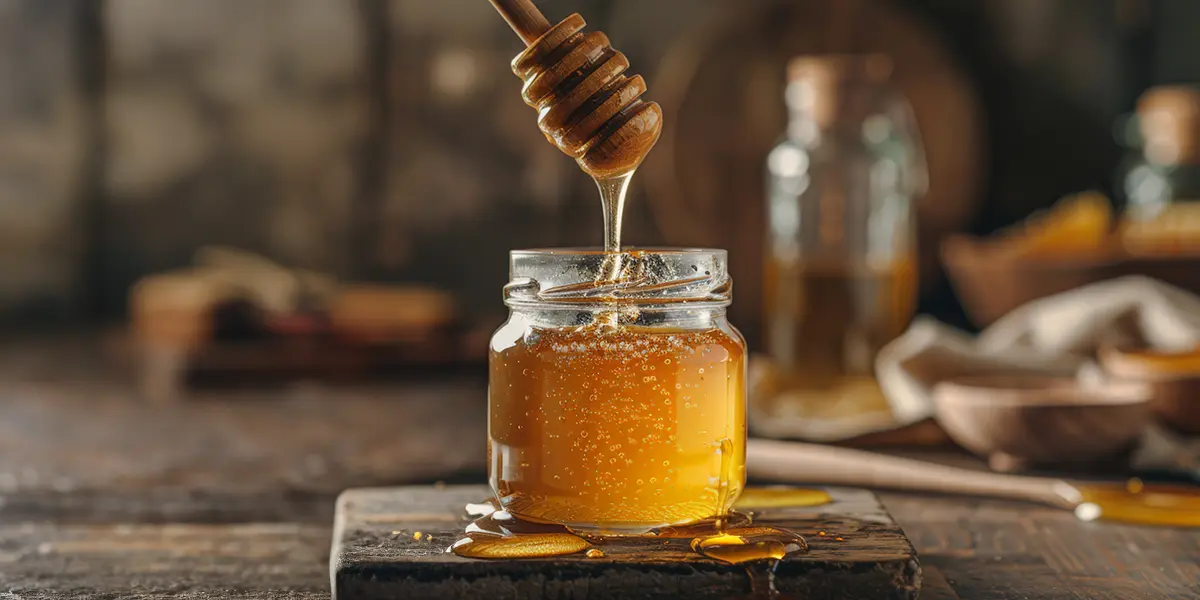Is Honey Good for Diabetes? Key Facts Explained

Honey is golden, smooth and irresistibly sweet, which glows like liquid sunshine. It is nature’s original sweetener. Before knowing whether honey is good for diabetes? Let us know a little about the stories of the honey. It is not just about satisfying your sweet tooth. It has stories that date back to ancient times; it is said that honey has been a go-to remedy for centuries, like soothing sore throats with a warm spoonful, healing wounds with its antibacterial properties, calming coughs better than some syrups, and even giving skin that soft, golden glow when used in homemade masks. In short, honey has been nature’s little first aid kit.
So what is Honey? A little more for you.
Honey is a natural, thick liquid sweetener made by honeybees from the nectar of flowers.
| Fun Fact 🐝
A single honeybee produces only about 1/12th of a teaspoon of honey in its lifetime! |
Now, if you have diabetes, you may think: Is honey good for diabetes?
Living with diabetes means that daily food choices can feel confusing sometimes, like what to eat and what not to eat. That’s why our expert nutrition coaches at Fitterfly offer personalised, one-on-one guidance, so that you can enjoy your meals with confidence.
No stressing about food choices, just make smart choices. Try it out.
Let’s revisit our sweet honey and explore its nutritional value and more.
What is the Nutritional value of Honey?
The nutritional value of honey, 100g ( the values are taken from the Ntuitive App)
| Nutrient | Amount |
| Energy | 319kcal |
| Carbohydrate | 79.5g |
| Protein | 0.3g |
| Total Fat | 0 |
| Fibre | 0 |
| So here’s the truth!
Since honey contains high amounts of carbohydrates, people with diabetes should absolutely avoid consuming honey, but if they choose to do so, they should limit their intake to smaller amounts. We all know it’s natural, but honey still raises blood sugar levels. |
What is the Glycemic Index(GI) of Honey?
Before learning about the glycemic index of Honey, let’s first understand what the glycemic index is.
The Glycemic Index (GI) tells us how quickly a food can raise blood sugar levels. Foods are scored between 0 and 100 based on this scale.
- Foods with high GI (GI > 70) – These foods are usually digested and absorbed quickly, causing a rapid spike in blood sugar levels.
- Foods with moderate GI(GI 56-69)- these foods are digested and absorbed at a moderate rate, faster than low GI foods, but slower than high GI foods.
- Foods with a low GI (GI < 55) – these foods are usually digested more slowly, resulting in a gradual and steady rise in blood sugar.
The glycemic index of Honey is around 58, which is moderate. It contains glucose and fructose, similar to table sugar. It should be consumed moderately.
What are the Different Types of Honey?
If you are confused about the different types of honey, all you need to know is right here.
- Raw honey: Pure, or unfiltered honey, is honey that is unprocessed and unpasteurized.
- Organic honey: Honey that is produced without the use of pesticides or synthetic chemicals.
- Clear honey: Clear honey is a filtered, transparent honey that is free from visible crystals, wax, and pollen. Texture is smooth, and commonly used in cooking.
- Set honey: It is also called crystallised honey or solid honey. It starts as a liquid but gradually becomes thick, grainy and semi-solid over time.
- Manuka honey: It is a premium, medicinal-grade honey that comes from bees that gather nectar from the Manuka plant, which grows in New Zealand and some regions of Australia. What makes this honey special is its unique antibacterial and healing properties, which are much stronger than regular honey.
A point to be noted: If you have diabetes, no type of honey is exactly good.
Honey Vs Sugar
Honey has a low glycemic index when compared with white or table sugar. Honey has a GI of about 58, while sugar has a GI of about 65. This means honey still raises blood sugar, but not quite as rapidly as white sugar. However, if you have diabetes, swapping sugar for honey is not a good idea, because both affect the blood sugar in similar ways. If you choose to eat honey, it’s essential to know how much honey you are taking.
Honey and Diabetes: What You Need to Know
There are no great benefits of including honey in the diet for people with diabetes.
For better blood sugar control, one should limit the intake of all types of syrups, such as maple, date, corn, and agave, which are all forms of added sugar. Even natural ones, such as honey, can raise blood sugar levels and should be used in small amounts.
It is very important to check your blood sugar levels very often to see how your body responds to honey or any other type of sweetener.
When you pair honey with any other food, the blood sugar level raises more than usual..
Are there any Benefits of Honey for Diabetes
There are no confirmed studies or research to suggest that honey is good for people with diabetes. However, honey does have some antioxidant and anti-inflammatory properties, but just for that, having honey (especially if you have diabetes) is a bad idea.
How Can We at Fitterfly Help You?
Many people think that honey is better than sugar. Some even replace sugar with honey, dates, or jaggery, believing they are healthier. However, the fact is that they can all still raise your blood sugar levels.
So how do you know what is really good for you if you have diabetes? That is where we step in. At Fitterfly, our expert nutritionists, diabetologists and dieticians help you clear the confusion and choose foods that actually support your health. Because when it comes to your health, small choices like picking the right sweetener can make a big difference.
You can also speak to one of our counsellors by simply making a missed call to 08068507599. We will get back to you.
This blog provides general information for educational and informational purposes only and shouldn't be seen as professional advice.
Frequently Asked Questions
How much honey can a person with diabetes eat?
People with diabetes ideally should avoid eating honey, but if they do, it should be in small, measured amounts. Honey is also a form of sugar and is high in carbohydrates. Honey can be consumed during hypoglycemia when blood sugar is below 70mg/dl.
Does honey have a low glycemic index?
No, honey has a moderate GI around 58, which is lower than white or table sugar( GI-65), but it still impacts blood sugar levels.
Is raw or organic honey better for people with diabetes?
Raw or organic honey or any form of honey still contains sugar. The impact on blood sugar is similar to that of regular honey.
Will honey spike my blood sugar levels?
Yes, consuming honey can cause a spike in your blood sugar levels.























